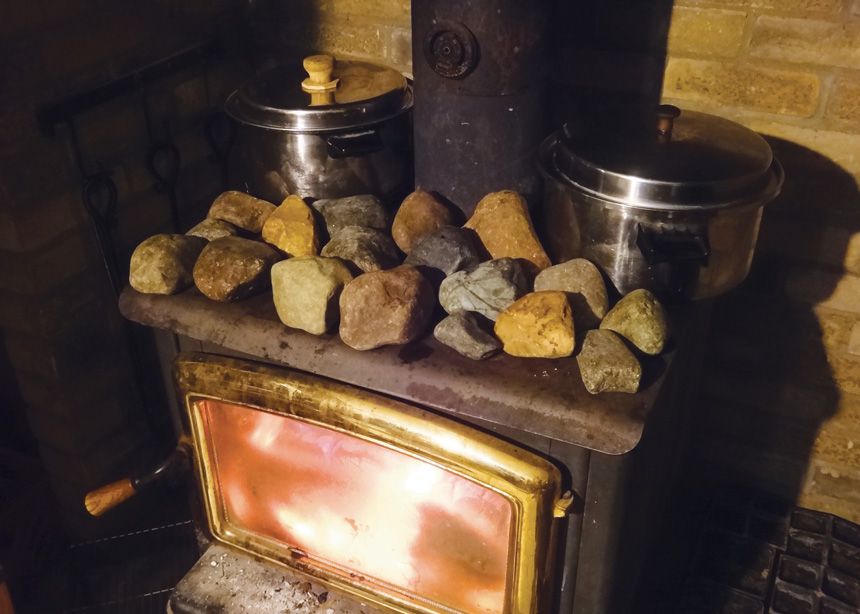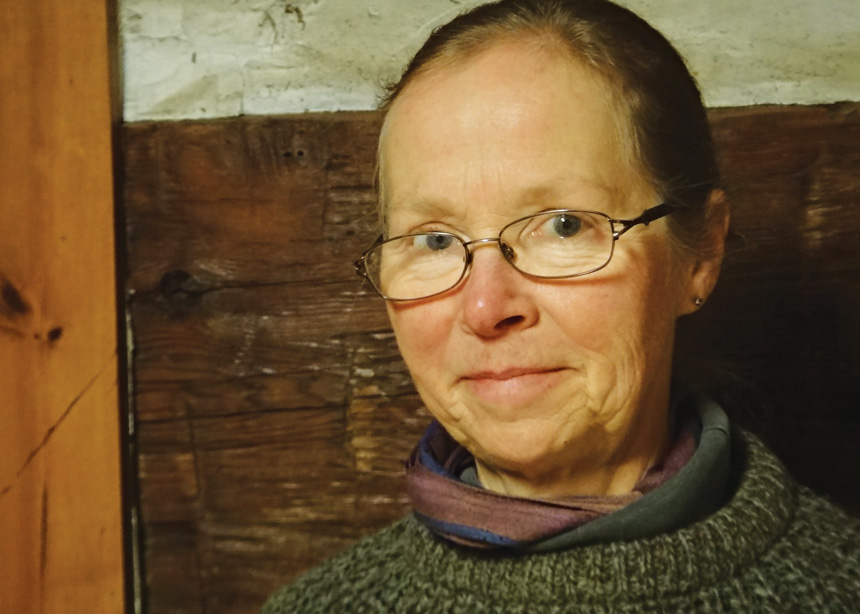One winter day in 2022, our family was discussing the problem of our society’s dependence on fossil fuels. One of our young-adult sons, who perhaps felt we were slipping into finger-pointing, brought the focus back around to our own household by asking: “What about our hot water heater?”
It was a loaded question. Though we’d taken steps to greatly reduce our use of fossil fuels, we relied on oil to heat our water.
With our hot water system up for reconsideration, I instantly tensed up. “What about it?” I asked.
I was alarmed, angry and anxious. Sometimes we need hot water. I suggested getting an on-demand electric water heater (which heats water as it comes out of the faucet), but I was not fully comfortable with that suggestion because our electrical systems are also environmentally problematic.
The question was really whether to have a water heater at all, and I disliked the challenge to my comfort and convenience.
We kept talking, trying to break the problem into manageable pieces.
We listed purposes for which we’d been using hot water: dishes, hand-washing, showers and laundering work clothes. I felt it important to have hot water readily available for those uses. I was adamantly unready to give it up.
Then we considered alternate ways to heat water. Someone suggested we keep a pot of water on the woodstove we use to heat our home during colder months. We were unsure as to what we might do during the warmer months, but decided we would work at that. In a pinch we could still use an electric kettle for a litre or two of hot water.
I still felt too agitated to constructively move further along that avenue with the rest of our household, so we agreed to take a break for a few weeks and return to the conversation after prayer and reflection.
Refreshing gift
When we did, it was I who suggested we try turning off the hot water heater to see whether we found the woodstove-heated water satisfactory. I figured that system would give us an opportunity to test using less heated water, perhaps freeing me from the sense of needing hot water on tap.
Some weeks later, I chose to switch from warm, pour-over showers to cold showers, going into the shower when I was warm. I still use warmed water to wash my hair in the winter. Cold showers have brought an unanticipated gift—not only are they tolerable, they’ve significantly reduced circulation issues in my feet.
I adapted my dish-washing techniques to use far less hot water than before, while still getting the job done well. We’ve become accustomed to cold-water washing for everything else. We’ve found hot running water isn’t actually necessary for our needs to be met.

Photo by Andre Wiederkehr.
When spring came, we built a small outdoor wood-fueled rocket stove. To further reduce wood use, we built some experimental solar cookers. One turned out to be a splendid way to heat water, both for dishes and cooking. We also warmed dishwater in our rickety sunroom, simply setting a potful of water on a table in the sun.
Despite missing the convenience of hot water on tap, we’ve felt no compelling need to turn on the hot water tank through the past 20 months, and for that I am grateful.
I have discovered I can do things which I’d thought I couldn’t. We have found ways to have hot water when we need it, and we have come to see that we need it for fewer things than we’d thought. The alternatives we now use have shown us that it takes a lot of energy to heat water, highlighting the absurdity of having kept 30 gallons of water heated at all times just for our convenience.
The experience proved a turning point for me.
Opening to change
I’ve found change to be both really hard to make or take, and also a great relief and gift. During the past several years, I’ve periodically prayed for a renewed mind, that I might be able to better discern what is truly good, what are actual needs (rather than wants), and in which direction God may be nudging.
Repeatedly, I’ve been grateful for the simple and profound song “Lead me, Lord,” (Hymnal: A Worship Book, #538), for it recalls me to the sanity of grounding myself in God when fears threaten to discourage or stall me.
It seems to me that when we’re unwilling to give up what is familiar, comfortable and convenient, our ability to think creatively about how else we might meet our actual needs and live the abundant life faithfully is hampered.
Our society’s scramble to develop “green solutions” is still rooted in seeking to avoid disruption to the way we’re accustomed to living. It’s troubling that, so far, all the mainstream solutions still depend on exchanging use of one set of non-renewable resources for another, maintaining dire environmental, social and economic consequences for some, particularly those who live in the regions being mined.
Unless we set ourselves quite different goals to reach, we’re almost guaranteed to resort to means similar to those which have brought us to the troubling global problems of our time.
Changing our lifestyle goals and expectations could free us up to find better life-ways. Often, I resist change because I’m part of the small percentage of people on earth who’s already well housed, fed and clothed. I don’t seek to change for the sake of change, then, but in order to find ways of living which are more faithful.
I’m just a clay jar!
Some people who know of changes our family has made say to us, “Good for you! If it makes you happy to do it, that’s great!” I find this discouraging. I’m not making changes in a pursuit of happiness but out of love. Loving possible descendants—whether my own or others’—means I need to live now in ways which will tend the earth in the direction of wholeness for the long haul. I try to consider what changes descendants might wish my contemporaries and I had made.
Sometimes, the changes our family is choosing are difficult and costly, but that doesn’t mean we ought not to choose them.
Sometimes, when people hear about our family’s endeavours, they ask me what I’ll do when I grow old. Currently our family rides bicycle to most of the places we go, though we occasionally still use our car. It’s hard work; I resisted it for some time before I tried, and found (just like with hot water) that I could do more than I’d thought. Still, I sometimes worry about whether I will be able to ride when I’m old. Will I be hardy enough to work with our current water system?
I’m well aware of my frailty; my body has never been particularly strong, and I’ve been aware of my reliance on a mixture of grit and grace since my 20s. How long can I continue doing what I’m doing now?
When I choose to forgo conveniences based on unsustainable systems, I must accept adjusted limits to what I can accomplish and how far I can go. Those things are hard. Some days, I grieve for what I used to assume was my right to enjoy, even though it had costs for others or other places which I didn’t want to admit.
I still live with tremendous comfort and convenience. I could list dozens, even hundreds of ways: good cooking pots, glass jars for food storage, cold water on tap, electricity. Yet, I hear Jesus’ urgent call to love my neighbour as myself, and that calls me to consider deeply both those who are living in more difficult environments now, and those who will live after I have passed on. I feel called to grow in directions which more truly fit within earth’s generous limits.
My heart hungers for and is nourished by others in the church who truly seek to rethink their lives and make changes toward a more wholly sustainable, faithful way of living, even though it may be costly. Anything worth anything costs someone; let’s choose wisely how we spend our selves.
Ruth Isaac Wiederkehr and her family live on a subsistence-oriented farm near Mildmay, Ontario. Their “Humans and Humus” writings appear every second month.








Leave a Reply
You must be logged in to post a comment.